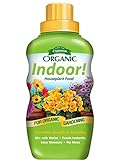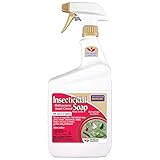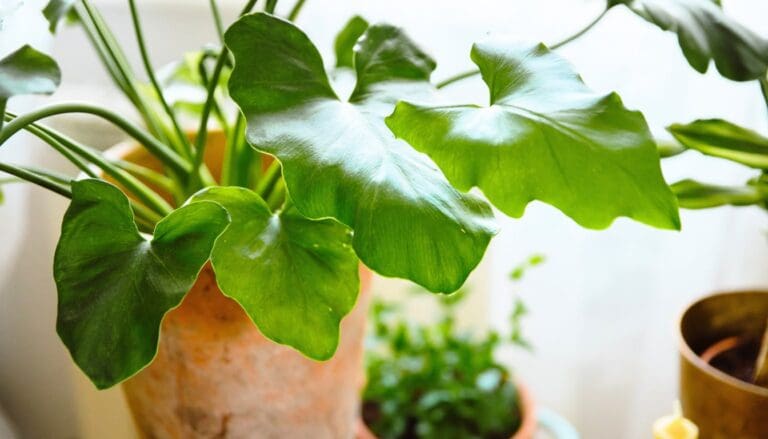Should I Fertilize My Boston Fern? (Ideal Fertilizer+When & How Much)
Boston ferns are houseplants that are prized for their bushy foliage. These plants spread out their delicate fronds to create an aesthetic look. The secret to getting bushy foliage from your Boston fern is by providing it with good fertilization.
Boston ferns need fertilization during the summer season, so it would be best to fertilize your boston fern with a water-soluble fertilizer with an NPK ratio of 20-10-20. Boston ferns are slow growers, but they need more Nitrogen and Phosphorous to support the frond development.
You can dilute the dose to half strength to avoid overfertilization. You should fertilize the Boston fern once a month during its growing season.
This article will discuss why you should fertilize your Boston ferns. It will also suggest the best fertilizer that will help your plant thrive. So, keep reading.

Please note: Simplify Plants is reader-supported. Some links in the post are affiliate links and I get a commission from purchases made through links in the post.
Why does Boston fern need fertilizers?
Boston ferns need water, sunlight, carbon dioxide, and nutrients to survive and grow like any other plant.
Fertilizers will support the growth of Boston ferns by providing them with essential nutrients.
The plant gets nutrition from the soil through its roots.
Therefore, you should prepare nutrient-rich soil for growing them.
But the soil, over time, loses nutrients as the plant absorbs some, and some are washed away with watering.
Hence, fertilization is important for maintaining your plant’s continuous growth.
Without proper nutrition, the plant will experience stunted growth, droopy leaves, weaker roots, and discolored leaves.
Lack of fertilization will make Boston ferns weak and ceases them to thrive.
What nutrients does Boston fern need?
All plants need nutrients to thrive, and fertilizers contain these in their formula.
Let us now understand what these nutrients are and how they are beneficial to your plant.
Macronutrients
Macronutrients are the essential nutrients that the plant in considerable amounts requires.
The NPK we mentioned earlier comes under Macronutrients. NPK stands for Nitrogen, Phosphorus, and Potassium.
| Nutrients | Uses |
|---|---|
| Nitrogen | Helps in developing thick, bushy foliage. |
| Phosphorous | Helps in building strong roots. |
| Potassium | Helps to protect the plant from pests and diseases and makes photosynthesis more effective. |
A few other nutrients, such as Magnesium, help the foliage get rich green color and calcium, which helps develop tissues in a plant.
Micronutrients
Micronutrients are nutrients that plant requires in minimal amounts.
These also promote the faster and bushier growth of plants.
These nutrients are iron, copper, zinc, boron, and manganese.
What are the different types of fertilizers?
There are two major types of fertilizer: Organic and Inorganic Fertilizers.
Let us understand these two in detail.
Inorganic fertilizers
The fertilizers that are available in the market are inorganic.
They contain chemicals, so that’s why they are termed inorganic.
These are of three types:
Slow-release fertilizer: These fertilizers are mostly suitable for outdoor plants as they slowly get released into the soil with each watering.
They are not preferable for Boston ferns as you can’t control the number of nutrients you provide.
Granular fertilizer: These fertilizers are available in the form of pellets.
You can add the pellets directly into the soil.
The pellets contain a large amount of Potassium and Nitrogen that can damage your plant’s roots and leaves if you are not careful.
Liquid fertilizer: The ideal fertilizer for Boston ferns are liquid fertilizer.
They are available in powder form, which you need to mix in water and prepare a liquid fertilizer out of it, or they are readily available in liquid form.
You can dilute it in water to prevent over-fertilization.
Organic fertilizers

Organic fertilizers are made up of natural substances and are great for plants that are sensitive to chemicals.
The only problem with organic fertilizers is that you can’t control their nutrient supply.
Therefore, before you think of using organic fertilizers, understand how much quantity is suitable for your plant.
If you don’t have a basic idea, start with a small quantity.
You can prepare organic fertilizers using eggshells, banana peel, compost, coffee grounds, etc.
We will discuss some of the recipes for organic fertilizers in this article.
What is the best fertilizer for Boston ferns?
Each plant reacts to fertilizers distinctly, and a houseplant owner should select the fertilizers accordingly.
Boston ferns will thrive best with water-soluble fertilizers since they are sensitive plants and will not react well to chemicals and salts.
The best Fertilizer for Boston ferns is a water-soluble fertilizer with an NPK ratio of 20-10-20.
The main focus of Boston ferns is their foliage and roots, so they need a high amount of nitrogen and potassium.
The plant does not produce flowers and fruits, so it won’t require much phosphorous.
There are some premade fertilizers available in the market for Boston ferns.
Earth Pods
Earth pots are natural fertilizers that come in convenient capsules.
You just need to place the capsule in the soil, and the fertilizer will slowly release into it.
The capsule lasts for 14 to 21 days, and after that, you need to add a new capsule to the soil.
It is organic and contains beneficial fungi and micronutrients.
You can buy Earth pods from Amazon here.
Miracle-Gro Shaken Feed Palm Plant Food
This fertilizer is made up of palms, and it will provide the plant with a continuous supply of nutrients for 3 months.
It has an NPK ratio of 12-4-8.
It also contains minerals like Magnesium, Manganese, and Iron.
You can buy Miracle-Gro Shaken Feed Palm Plant Food from amazon here.
Osmocote Smart Release Plant Food
Osmocote Smart Release Plant Food lasts for more than 6 months.
The fertilizer has an NPK ratio of 15-9-12, and it is a time-release formula that will provide a steady supply of nutrients to the plant.
It is safe for use and does not burn your plant’s roots even if you overdo it.
You can buy Osmocote smart release plant food here.
Grow More fertilizer
The most suitable fertilizer for Boston ferns is Growmore fertilizer which has a balanced blend of nutrients.
The fertilizer has an NPK ratio of 20-10-20.
It has lots of potassium and nitrogen for supporting fronds development.
It is highly soluble, so you can directly mix in the soil or dilute it in water as per your choice.
You can get Growmore fertilizer here.
JR Peter’s 20-20-20 Fertilizer

It is a highly concentrated, water-soluble fertilizer.
This fertilizer has a good blend of micronutrients and macronutrients to enhance plant growth in depleted soil.
Buy JR peters fertilizer from amazon here.
Organic fertilizer for Boston ferns
If you don’t want to use chemical fertilizers on your plant, choose organic fertilizers.
Below are some organic fertilizer recipes that you can choose for your Boston fern.
Recipe 1

You can prepare this fertilizer recipe using ingredients like coffee grounds, eggs, and banana peels.
Coffee grounds are rich in nitrogen, the banana peel contains plenty of potassium, and eggs are a good source of calcium.
You can make this fertilizer by following the steps given below:
- Cut the peel of one banana
- Crush the shell of an egg
- Take one cup of coffee grounds
- Grid all three ingredients and add water to them.
Once the fertilizer is ready, apply it to the plant whenever you water it.
Recipe 2
You can prepare this homemade fertilizer using Epsom salts, Baking soda, and household ammonia.
Epsom salts are rich in Magnesium and Sulfur, baking soda reduces the risk of root rot, and household ammonia is a good source of Nitrogen that enhances roots and leaf growth.
Here are the steps given below to prepare this organic fertilizer.
- Take 1 and ½ tablespoons of Epsom salts in a container.
- Add 1 and ½ tablespoons of baking soda to the container.
- Add ½ teaspoon of household ammonia and pour it into the container.
- Fill water in the container and mix all the ingredients.
- Provide water you plant with this homemade fertilizer.
If you are choosing the organic route, you can also use Seaweed solution and Epsoma indoor plant food.
Do Boston ferns like Epsom salts?
Epson salts are mineral compounds made up of two substances, Magnesium, and sulfate.
Magnesium acts as the building block of Chlorophyll responsible for the green color of leaves.
And sulfur will helps in the easy absorption of nutrients from the soil.
Boston ferns require these minerals, and they lose them through watering over time.
During such time you need to add Epsom salts to rescue the plant.
For application, mix two tablespoons of Epsom salts with 1 gallon of water, fill the solution in a spray bottle, and use it every month on your Boston ferns.
How to fertilize Boston ferns?
If you are using a water-soluble fertilizer, it’s quite easy to use.
You simply need to dilute the recommended dose as written on the fertilizer label.
But I will recommend you dilute the fertilizer at half strength.
In this way, you will reduce the risk of over-fertilization, and also, the plant will get enough of what it needs.
Apply fertilizers to the soil’s surface rather than tilling it, as tilling can cause injuries to the Boston fern’s shallow root system.
But if you are using household ingredients such as coffee grounds and banana peel, you need to blend them and prepare a pulp before mixing it in water.
What is the best time for fertilizing Boston ferns?

Boston ferns are native to tropical forests of Africa, Central, and South America.
In their native region, they absorb nutrients from rich sources like fallen leaves. However, as houseplants, they won’t show any outward signs indicating they need fertilizers.
Since Boston ferns are slow growers, fertilizing the plant during the growing season is enough to fulfill their nutritional requirements.
The growing season starts from spring until the end of the summer.
This is when the plant grows actively, and fertilizers can become their helping hands.
Since they grow slowly, they don’t require heavy fertilization.
A good schedule provides them with fertilizers every 4-6 weeks during the growing season.
Can I fertilize my Boston ferns during winters?
Boston ferns become dormant during the winter season, and they do not show any growth.
Hence, during this time, they require less to no fertilizer.
One of the main reasons your plant dies during the winter season is when you over-fertilize it.
The excess fertilizers will burn the roots, hinder plant growth, and kill it.
You can reduce fertilizers to 2 to 3 months, but it isn’t strictly necessary.
Fertilize the plant at half the recommended rate to prevent over-fertilization.
In winters, use distilled water once a month to water your Boston ferns.
This will help flush out the extra salts that might have accumulated in the soil due to fertilizers used.
What happens when you over-fertilize Boston ferns?

Boston ferns are sensitive plants, and if you apply too many fertilizers, they suffer from severe damage.
When you fail to determine the exact dose, you overfertilize the plant.
You should dilute the fertilizer or use less of it if you don’t know the exact dose.
You will notice the following signs if you over-fertilize your Boston ferns:
- Brown edges and tips on leaves
- brown spots on leaves
- Discolored leaves
- Wilted leaves
- Burned roots
- Salt buildup on the soil surface
If you notice any such signs and there are no other reasons behind them, you are overfertilizing your plant.
You need to check your plant’s fertilization routine to find where you are making mistakes.
How to fix an overfertilized Boston fern plant?

If you have over-fertilized your plant by any chance, you need to take the following steps and start the treatment as quickly as possible.
- First of all, examine the condition of your Boston fern thoroughly.
- After that, prune all the damaged and dead leaves and parts with sharp and sterile pruners.
- Remove the top few inches of the soil to eliminate the excess salt buildup from the soil.
- Give your plant a good bath by keeping it under running water to get rid of the excess fertilizers from the soil. After that, allow the excess water to drain out from the pot.
- If some plant roots are burned, then cut off the damaged ones and repot your plant in a fresh soil mix.
- Avoid fertilizing the plant for 5-6 months when your plant is recovering.
- Prepare a fertilization schedule once your plant has recovered and started showing growth.
Reference: University of Florida, The University of Arkansas Division, Texas A&M University System, The University of Georgia, University of New Hampshire, Wikipedia, The Royal Horticultural Society.
Recommended Garden Supplies
| Product Image | Our Recommended Gardening Supplies | Check Offers! |
|---|---|---|
Top Top
Top
Top
Top
Top
Top
Top
Top | rePotme Houseplant and Tropical Classic Potting Soil Mix | Check Offer On Amazon |
 Top
Top
Top
Top
Top
Top
Top
Top | Espoma Organic Indoor Plant Food | Check Offer On Amazon |
 Top
Top
Top
Top
Top
Top
Top
Top | GooingTop LED Grow Light 6000K Full Spectrum Clip Plant Growing Lamp | Check Offer On Amazon |
 Top
Top
Top
Top
Top
Top
Top
Top | Soil Moisture Meter | Check Offer On Amazon |
 Top
Top
Top
Top
Top
Top
Top
Top | Govee Hygrometer Thermometer, Bluetooth Enabled! | Check Offer On Amazon |
 Top
Top | LEVOIT Humidifiers for Large Room(Best For Plants) | Check Offer On Amazon |
 Top
Top
Top
Top
Top
Top
Top
Top | Upgraded DIY Automatic Drip Irrigation Kit, 15 Potted Houseplants Support | Check Offer On Amazon |
 Top
Top
Top
Top
Top
Top
Top
Top | Stainless Steel Heavy Duty Gardening Tool Set | Check Offer On Amazon |
 Top
Top
Top
Top
Top
Top
Top
Top | Bonide Insecticidal Soap | Check Offer On Amazon |
 Top
Top
Top
Top
Top
Top
Top
Top | Bonide 32 oz Spray Neem Oil for Organic Gardening | Check Offer On Amazon |
 Top
Top
Top
Top
Top
Top
Top
Top | Garden Safe Fungicide | Check Offer On Amazon |








